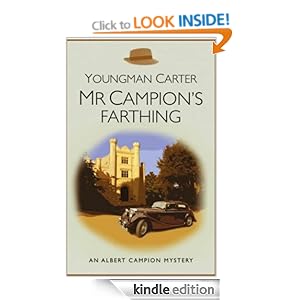Mr Campion's Farthing is my
personal favourite of the two Youngman Carter 'Albert Campion' Mysteries recently republished by Ostara. This may well be because
it's the closer to a 'genuine' mid-period Allingham.
Let me explain. Pip Youngman Carter
was the husband of detective novelist Margery Allingham – she who
is regularly linked with Christie, Sayers and Marsh as a Golden Age
'Queen of Crime'. Youngman Carter and Allingham had met as teenagers
and were married in 1927. She was the worker: he was the artist,
illustrator, good time guy and – sometimes, at least – motivator.
Within two months of their marriage they had begun The Crime at
Black Dudley, first of the Albert Campion novels. Allingham
dictated: Youngman Carter wrote. He offered her confidence, jokes,
plot-lines and spelling help. Writing was fun in those early days.
People and marriages age, however, and as Allingham's success and dedication grew, Youngman Carter's involvement waned. It was not long before the Campion novels were hers alone with Youngman Carter as the primary audience and occasional provider of plot detail. They were both lifelong writing professionals. He co-founded and edited Soldier magazine, edited the Tatler and wrote for the Daily Express as well as producing three books about wine and continuing his career as a book jacket designer. When Margery Allingham died in 1966, Youngman Carter completed Cargo of Eagles – the Albert Campion novel she was writing at the time. He then began producing Campions of his own. Mr Campion's Farthing was the first and, in an author's note, Youngman Carter explains that this story originated from an idea of Allingham's discussed before her death.
That's entirely credible as Mr Campion's Farthing is full of characters, locations and turns of phrase that have equivalents throughout the Allingham oeuvre – most obviously in her writing from the 1930s and early 1940s. The central location, Inglewood Turrets, is a crenellated, architecturally illogical, late-Victorian rich man's house just five miles outside London. Its creator, Sir Edwin Cambric was a textile magnate who had “a glorious time making an ass of himself, did no man harm and enjoyed every moment of it”. Sir Edwin died in 1904 (the year that both Allingham and Youngman Carter were born) and the current owner, Miss Charlotte Cambric, is doing her best to maintain the viability of the house by running it as a Themed Victorian Hotel for wealthy visitors. She's a typical Allingham grande dame with shrewd business sense and there's plenty of humour and rococo detail in Youngman Carter's presentation of Miss Cambric's enterprise and her staff.
Charlotte Cambric is, unsurprisingly, under threat from a predatory business tycoon, Clifford Denmark of Denmark Holdings who is unimpressed by the late Victorian glories of the house but is eager to acquire the site, demolish and rebuild. More surprisingly Miss Cambric has become embroiled in some murky Cold War shenanigans centred around the disappearance of Vassily Kopeck, an awkwardly-ethical, possible defector from the USSR (Kopeck = Farthing, geddit?). Kopeck is a scientist who possesses a dangerous secret. Albert Campion is recruited by his old colleague L.C. (Elsie) Corkran to investigate and so the fun begins.
Mr Campion's Farthing is fun. For my taste the plot is a trifle incoherent, Rupert Campion is an oddly disappointing character and it lacks the murky personal depths of a true late Allingham. Nevertheless it's clever, it's well-written and it's packed with self-consciously Olde Worlde entertainment. Youngman Carter is treating his wife's literary legacy in a way that's satisfyingly similar to the way his character, Miss Charlotte Cambric, treats her inheritance, Inglewood Turrets. He's dressing up in authentic period costume and putting on a good show to make money. Well, why not?
This review was first published in Shots Magazine http://www.shotsmag.co.uk/default.aspx

No comments:
Post a Comment